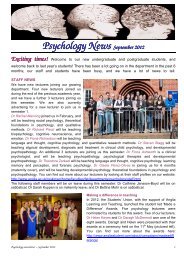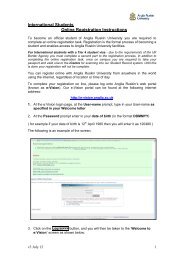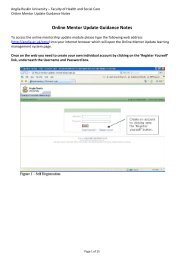Supporting the underachieving learner - Guide for mentors
Supporting the underachieving learner - Guide for mentors
Supporting the underachieving learner - Guide for mentors
Create successful ePaper yourself
Turn your PDF publications into a flip-book with our unique Google optimized e-Paper software.
Failing a <strong>learner</strong> can have a number of effects on <strong>mentors</strong> and sometimes <strong>the</strong> whole health care team<br />
and <strong>the</strong>y may include:<br />
Frustration with <strong>learner</strong>s’ lack of positive change and resentful and angry about <strong>the</strong> demands <strong>the</strong><br />
<strong>learner</strong> places on <strong>the</strong>m<br />
Concern that <strong>the</strong>ir own skills are inadequate <strong>for</strong> a specific <strong>learner</strong>’s needs<br />
Ambivalence about <strong>the</strong>ir commitment to <strong>the</strong> dual role of nurse/ midwife and mentor<br />
Resistance to recognising serious learning difficulties because <strong>the</strong>y want <strong>the</strong> <strong>learner</strong> to succeed<br />
Anxiety that <strong>the</strong>ir own expectations are unrealistic <strong>for</strong> <strong>the</strong> <strong>learner</strong>’s stage of learning.<br />
Fear of being overruled by <strong>the</strong> HEI<br />
Maloney et al. (1997)<br />
The mentor may feel tension at <strong>the</strong> conflict between <strong>the</strong> teaching, supportive role and <strong>the</strong> assessing<br />
component and see <strong>the</strong> failure of <strong>the</strong> <strong>learner</strong> as a personal reflection of <strong>the</strong>ir standards of supervision and<br />
teaching. These reactions and effects can interfere with <strong>the</strong> fail scenario and lead to avoidance or a<br />
'failing to fail' picture developing. This was highlighted by Duffy (2003) in a report entitled “Failing<br />
students: ‘A qualitative study of factors that influence <strong>the</strong> decisions regarding <strong>the</strong> assessment of <strong>learner</strong>s’<br />
competence to practice’.<br />
Stuart (2003) highlights <strong>the</strong> o<strong>the</strong>r end of <strong>the</strong> continuum with <strong>the</strong> rare potential of <strong>mentors</strong> abusing <strong>the</strong><br />
power to fail and using it as a tool to exert control and punish 'difficult' or 'unpopular' <strong>learner</strong>s.<br />
Failed <strong>learner</strong>s may react in a number of ways. These reactions should be seen as a response to <strong>the</strong><br />
news of failure as opposed to a personal attack or vendetta against <strong>the</strong> mentor. Learners need time to<br />
process <strong>the</strong> in<strong>for</strong>mation and 'grieve' <strong>for</strong> <strong>the</strong>ir loss as a result of failing <strong>the</strong> placement. There<strong>for</strong>e <strong>the</strong><br />
discussions should be conducted in private with adequate time given to ensure that <strong>the</strong> appropriate<br />
support is provided.<br />
Activity 6<br />
Take 5 minutes to consider <strong>the</strong> possible reaction from <strong>the</strong> <strong>learner</strong> if <strong>the</strong>y are failed and how you might<br />
manage <strong>the</strong>m.<br />
Adapted by Anglia Ruskin University from NHS Lothian / NHS Borders V 1 2013 13











